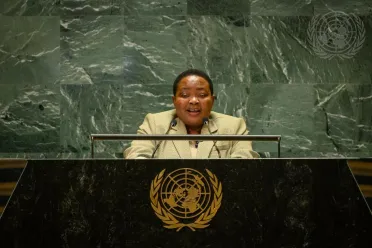Statement
Statement summary
ROBINAH NABBANJA, Prime Minister of Uganda, said “we can all agree that the world is not in a good place”, calling for urgent action to address global inequalities that produce poverty, hunger and disease, which disproportionally affect the most vulnerable. “We reject the increasing competition and confrontation between major Powers, which undermines the collective international responses to security, peace, stability and social economic development,” she stressed. Turning to Security Council reform, she recalled the Common African Position, that the continent have two permanent seats, with veto privileges, if others have it, as well as two non-permanent seats. Africa aspires to gain representation on the Security Council as “equal partners and make a contribution to a multilateral system that should become inclusive, equitable and work for the international peace and security of all, without paralysis or succumbing to parochial interests of major Powers”. Moreover, the continent demands the right to development as “equal members of the international community” without politicized preconditions.
Financing is one of the biggest challenges to implement the 2030 Agenda, she said, noting that sovereign debt and loans at a zero-interest rate will facilitate productive investments in infrastructure and make debt sustainable, also permitting growth. Like other developing countries, Uganda faces challenges on domestic resource mobilization due to a limited tax base. To that end, Uganda calls for the “strengthening of the international cooperation in tax matters to ensure that it is effective and inclusive”, in part by requiring multinational companies to pay taxes where their operations take place, including through e-commerce and cross-border transactions. Further, the global financial architecture must be reformed urgently, she said. Domestically, the country’s national development plan focuses on areas including agro-processing, industrialization, technology and skills development, she said, highlighting the infrastructure required for such ambitions and calling on the international community to support the full implementation of the African Continental Free Trade Area — also inviting foreign direct investment (FDI). Sustainable foreign debt will create jobs and increase tax revenues.
She further called on multinational companies to stop buying raw materials only to process and resell them for consumption in developing countries, proposing that those that do should allow profit-sharing schemes for the countries that produce them. Also, “Uganda calls on developed countries to provide the necessary financial, technological as well as capacity-building to support developing countries to effectively address climate change,” she said, calling for climate justice, noting that climate financing should be additional to official development assistance (ODA). In a similar vein, noting that developing countries are particularly affected by unilateral political actions and the weakening of multilateralism, she called for an end to economic, commercial and financial blockades imposed on “sisterly nations under sanctions, which is a major impediment to their sustainable development”. Noting that Uganda currently holds the chairmanship for the Group of 77 and the Non-Aligned Movement, she reaffirmed the county’s commitment to working in solidarity to achieve a revitalized multilateral system capable of addressing today’s global challenges.
Full statement
Read the full statement, in PDF format.
Photo

Previous sessions
Access the statements from previous sessions.
